Yesterday, during our live webinar, Rosalind Gardner and I discussed creating websites for people - not search engines. What this means is that websites should be designed for the human visitor: provide solutions, easy to read, easy to navigate.
This is in contrast to designing around shady search engine tactics that promise server-crushing traffic, but in the end don't engage human visitors or result in decent conversion rates - and can ultimately get you delisted from the major search engines altogether.
The search engines prefer visitor-friendly sites. Human searchers are their target market, and their goal is to provide them with ideal results.
Does this mean you shouldn't write SEO Content? Not at all! In fact, choosing keywords & phrases very strategically will help you strike that balance between search engines and human visitors.
In this quick tutorial, I'll show you exactly how I do that...
Writing SEO Content begins with choosing keywords & phrases. Your target market (human visitors) will reveal exactly what they're looking for by typing keywords and phrases into the major search engines. Tools like WordTracker allow you to analyze the popular keyword phrases and their search volume:
http://freekeywords.wordtracker.com
That link will open in a new window, or a new tab. I keep it open in a separate tab all the time, and refer to it a dozen times a day or more. There are a number of keyword research tools and software programs you can use, and most are fine, but I find this free WordTracker tool to be simple and fast...
As an example, let's say you have a website all about bass guitars. You type in bass guitar into the field at WordTracker, and see these results:
This is a nice little micro-niche, don't you think? 😀
Looking over this list, we are choosing keywords & phrases that might inspire some good ideas for SEO Content. Any of these phrases will make for great pages on your niche website, but we'll assume you already have a website and you're looking for creative ideas for providing something new & valuable to your visitors.
The image above does not show the whole list you will see at WordTracker, but as I scanned down through those results a word stood out to me: chart. If we add that to our keyword search, we see these results:
A quick search on Google shows a good number of pages, images and even PDF files for bass guitar charts. This might immediately put most people off, but it's also an opportunity. Your target market is stuck wading through all of those options, so one idea is to help them out and write a blog post series reviewing the available charts and pointing out the best charts to use.
If you have a mailing list for your site (and you should), you could send them a download link to the best chart and also a link to your series of chart reviews. Would they appreciate that and look forward to future emails from you? You betcha!
A mailing list manager like Aweber will archive your newsletter issues or broadcast emails, which will also get indexed and show up in search results. Here's an example of one that I found on Google. That's an easy way to create relevant backlinks to your content pages.
That's just one idea of choosing keywords & phrases, and then leveraging the competition to create your own unique and valuable SEO Content.
Obviously free charts are not a commercial search, or the type of content you can easily monetize. If it were me, I would provide great value in the reviews and selections and then encourage visitors to subscribe to my blog or newsletter for more great resources. You might even provide a short report (a PDF file) listing the 10 best bass guitar charts as a bonus for those who subscribe. Great matching call-to-action!
Now let's look at keyword searches with more of a commercial intent.
Scanning through our keyword list again, I'm choosing keywords & phrases that show an intent to buy. One such phrase is "bass guitar accessories". One look at the Google search results shows that this phrase is pretty competitive. Without doing any major competition analysis, you can easily see that there are a lot of sponsored listings and well-optimized results:
Competition? Good! This means you can write up a nice little blog post, optimized for "bass guitar accessories" and expect decent payout on strategically placed Adsense. While it may take you awhile to compete in the actual search results for this phrase, established bloggers or website owners would do well to send a note to their list with a link to this post, using the title: Best Deals on Bass Guitar Accessories.
You could also use this in article marketing, writing SEO Content titled "Buying Bass Guitar Accessories Online" and linking back to your page or post. It would also make a great signature link in guitar or musician forums, of course.
Now if you actually sell bass guitars and accessories on your own website, this is not the best approach. Obviously that would work well for someone with a niche community or content website. So next we'll imagine that you have an affiliate site that promotes these physical products.
So You Want To Sell Products?
The best way to sell products online through SEO Content is by using longtail keyword phrases. Longtail phrases are keyword phrases with 3 words or more. In these phrases, your target market is telling you very specifically what they would like to buy. That being the case, these longtail keyworde phrases result in a much higher conversion rate than general search terms.
Scrolling back through my original keyword list for "bass guitar" I find the word "beginner" in the mix. I decide to explore that a bit, so I click on it to see the results with that word included:
Hmm. There are only 47 searches total on this topic, and only 22 searches for the main phrase "bass guitar for beginners". I guess it's not really worth creating a blog post or a web page for that phrase. Right?
Wrong! 😛
A quick look at the Google search results for this phrase shows that it is not at all competitive. The top search result only has 11 inbound links outside of it's own domain, and another of the top 10 results only has ONE backlink (and it is an internal link from their own domain at that), and there is even one link in the results that goes to a placeholder page.
See: Analyzing Backlinks
Bottom line: It would be VERY easy to rank in the top 10 on Google for the phrase "bass guitar for beginners" (yes, without quotes).
While it's true that phrase is only searched approximately 22 times a day, that means that it is searched more than 600 times a month - or close to 8,000 times a year. Would you like 8,000 opportunities to sell a bass guitar with an easy top ranking? Would it be worth a couple of hours working on a nice piece of SEO Content for your site or blog to be in this position? Of course!
Most of your competitors are fighting for top placement with broader keyword searches, or more competitive keyword phrases. Choosing keywords & phrases that are less competitive and more specific not only make for easier rankings, but they also convert better for you!
What about the other phrases in that list, with only 1-8 searches a day? Again, it's worth 10 minutes or even 2 hours of your time to write the SEO Content once, and let it work for you forever.
All you have to do is invest a little time upfront (or outsource the writing, even) and that little piece of content could trickle traffic in for years.
Using Keyword Qualifiers in your Keyword Research
I like to have a little fun with my keyword research, and try adding various qualifiers to the phrases to see what I come up with. They will vary between niches, but some of my favorite "keyword qualifiers" are: buy, order, get, find, products, download, deal, best, reviews, compare - just to name a few.
By the way, "bass guitar reviews" is another phrase that is not very competitive in the top 10 Google search results. 😉
Speaking of qualifiers, like the word "buy", did you know there are over 1,500 searches a day for... buy mini muffin pans? And did you also know that the #1 organic result for that phrase (without quotes) is an article on articlebase.com? Yeah... I'm serious. If you don't believe me, take a look for yourself.
See: Using Keyword Modifiers to Qualify Visitors
Let's say you want to sell designer handbags. Take a look at these keyword results:
If I were choosing keywords & phrases to optimize my page, I would choose #3: "buy womens designer handbags online". Talk about qualifying their intent! Cha-ching! 😉 That is one beautiful 5-word longtail keyword phrase.
And guess what? The #1 organic result on Google... only has ONE inbound link (excluding their own internal links). The #2 result is a blogger blog with less than 15 inbound links (total).
See? It's Easy!
Writing web content your visitors will love is not rocket science. It's all about choosing keywords & phrases that match what you offer, to the people who are searching for it.
Creating properly optimized SEO Content will make both search engines and visitors happy, and will turn your blog or website into a passive profit generator.
Best,
p.s. Like this SEO Content tutorial? Subscribe below for more great tips & tutorials in the ongoing Web Content Writing series. 😉
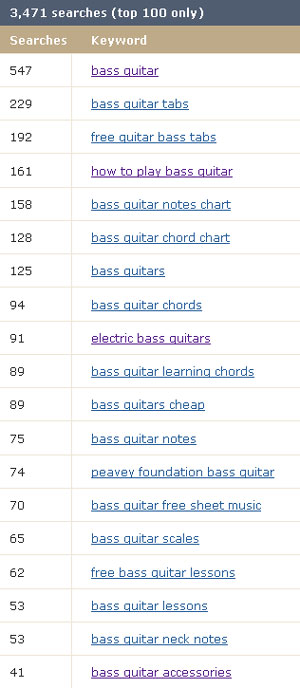
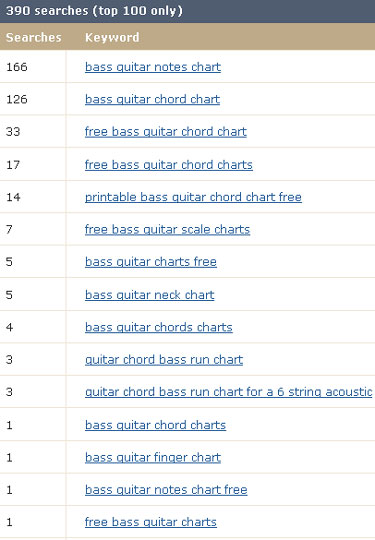
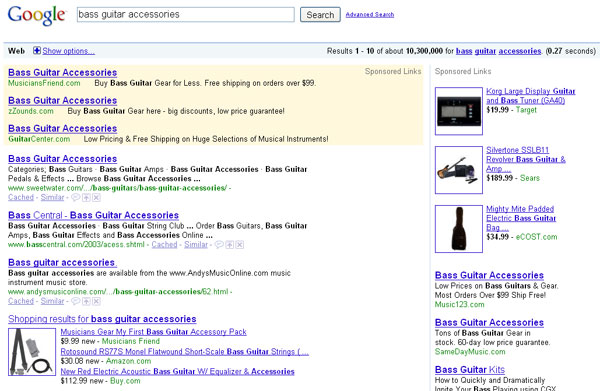
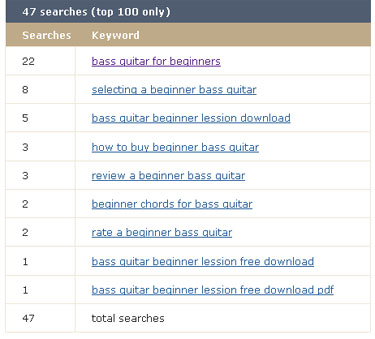
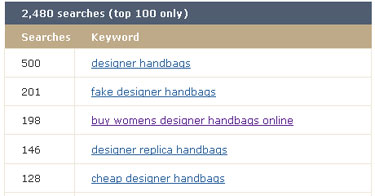









I couldn't agree more. I have found that by writing for my readers in a natural manner, I will be including keywords and terms related to my seo content or whatever it is I am "marketing." The more you attempt to write for the search engines, the more you will alienate users. Ultimately, it is the reader that converts with cash, not the search bots.
Writing for the search engines is a fool's errand- especially considering how often the search engines change the game. If you write for your readers by offering valuable content that is well written and relevant to your website's services or products, you'll attract the search engines by default. It's only when you start to think about Google too much when your writing begins to suffer.
Wow, Lynn - this is so detailed that I wish I read this before I ever started. Now I have a new twist to how I already do keyword research.
😀 That article got me fired up. I just want to start writing content.
Also it's a good idea to have different target keywords in your content 🙂
Lynn,
Yet another fantastic post. I tend to try to think of it from the perspective of the user of the search engine, and what would they expect to see when they click on results. If we can serve the articles up in a manner that helps SEO all the better!
Thanks for the tips.
For a beginner like me, it has been very informative and inspiring to learn about choosing keywords and phrases from you. I am delighted to know more about how to analyze backlinks too.
Thank you.
I can’t believe I just now stumbled onto this article. Thanks for the great practical advice on keyword research.